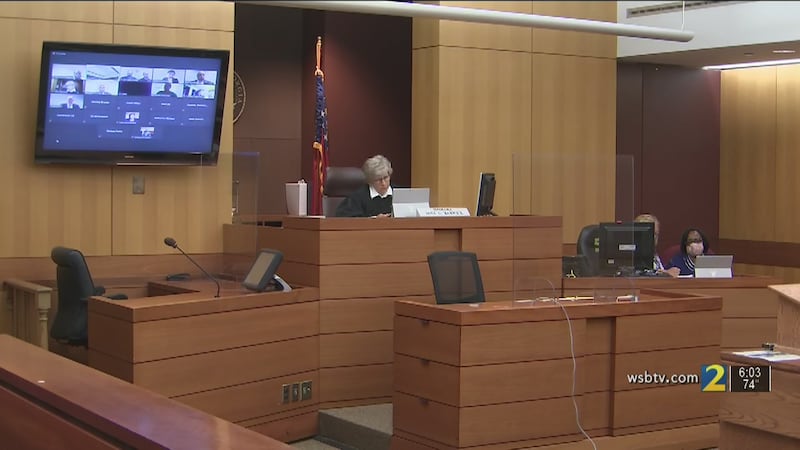ATLANTA — A Fulton County judge granted bond to a former Atlanta police officer charged with murder in the shooting of Rayshard Brooks.
Fulton County Superior Court Judge Jane Barwick issued a $500,000 bond for Garrett Rolfe. Barwick said Rolfe’s ties to the community had been demonstrated to the court’s satisfaction in regards to being not a flight risk.
The bond does come with the following conditions. Rolfe:
- Must wear an ankle monitor
- Will have a curfew from 6 p.m. to 6 a.m. with exceptions for work, legal or medical reasons
- Must surrender his passport
- Is not allowed to possess or carry any firearms
- Will not have any contact with family members of Brooks or any witnesses, including the three other victims in the case
- Will not have any contact with other police officers
Rolfe shot and killed Brooks on June 12 in the Wendy’s parking lot on University Avenue after Brooks fought with officers and took their taser. The officer is facing a total of 11 charges.
Defense attorneys Bill Thomas and Noah Pines argued that Rolfe was not a flight a risk and submitted 28 character letters to the state on Rolfe’s behalf.
The attorneys requested a $50,000 to $100,000 signature bond. The state asked for a bond of $1 million with several conditions. The only conditions the judge did not grant were the state’s request that Rolfe disclose the pass code to his phone and turn over any communication between himself and other officers since the shooting. The judge said those were issues for another hearing.
The state argued cell phone records show Rolfe sent text messages to four Atlanta officers in the minutes after the shooting. The state said it has not been able to access the phone because Rolfe has not given the passcode.
Rucker says cell phone records show in the minutes after #RayshardBrooks shooting, there were multiple text messages b/t Rolfe and four different APD officers, but State can’t review bc Rolfe’s attorneys won’t hand over passcode.Rolfe lawyer cites right to remain silent @wsbtv pic.twitter.com/JgPDZ81Fxf
— Nicole Carr (@NicoleCarrWSB) June 30, 2020
The judge broke down the bond by charge as follows:
- $250,000 - Felony murder
- $20,000 - Violation of Oath
- $20,000 - Violation of Oath
- $20,000 -Violation of Oath
- $20,000 - Violation of Oath
- $10,000 - Criminal damage to property in the 1st degree
- $35,000 - Aggravated assault with a deadly weapon
- $35,000 - Aggravated assault with deadly weapon
- $35,000 - Aggravated assault with deadly weapon
- $35,000 - Aggravated assault with deadly weapon
- $20,000 - Aggravated assault
Brooks’ widow Tomika Miller gave an emotional victim impact statement during the hearing. Miller told the court she has trouble sleeping and that she would not be able to mentally handle Rolfe being granted bond. At one point, Miller became so emotional she had to stop her statement to get herself together.
“My husband did not deserve to die and I should not have to live in fear while waiting for the man who killed my husband to be tried in court,” Miller said. “My husband wasn’t perfect, but he didn’t deserve to die.”
Brooks’ family released the following statement after Rolfe was granted bond:
“While the family of Rayshard Brooks is disappointed that his killer was granted bond today, they understand that this is just one step in the long quest for justice for Rayshard. Rather than looking at this process as a series of ‘wins’ or ‘losses,’ it’s imperative that we continue to push for systemic change within our criminal justice system. From hate crime laws being passed to increasing oversight of members of law enforcement, our job is to ensure that positive change comes from this tragic situation. We will be diligent in our pursuit of justice for this family and will do everything in our power to make sure that Rayshard Brooks did not lose his life in vain.”
[RELATED: 911 call details moments that led up to killing of Rayshard Brooks']
DECIDING BOND WITH MURDER CHARGES
It is not uncommon for a judge to grant bond even for defendants facing murder charges. Channel 2 investigator reporter Nicole Carr has covered stories here in Georgia in which that has happened.
The seriousness of the charge is not always what factors into the request, but it can and also play a part in the conditions of the bond.
The defense argued Tuesday that Rolfe’s character and professionalism are bond merits. The state argued the potential for Rolfe to communicate with witnesses and leave Georgia
Before the hearing Tuesday, Carr spoke with legal analyst Esther Panitch. She echoed the judge in outlining bond release merits used in Rolfe’s case.
“You can look at the charge in that it’s serious charge, which is why you would consider not giving bond, but that’s not the purpose of the bond statute. It’s not to punish somebody who is still presumed innocent,” Panitch said. “It’s to make sure that person shows up to trial, and that they’re not a danger to the community while they are out.”
In Channel 2 archives, we can see how murder charge bond decisions had similar outcomes for first time suspects.
In Nov. 2017, an Atlanta widow said her family witnessed a man kill her husband. He was released on bond a month later.
Court documents show the defendant’s lack of a felony record and another pending procedure played a role in the bond release.
In 2015 when DeKalb officer Robert Olsen killed an unarmed veteran named Anthony Hill, there was also a bond granted in the case. In 2019, Olsen was found not guilty on murder charges and convicted on lesser charges.
© 2020 Cox Media Group






